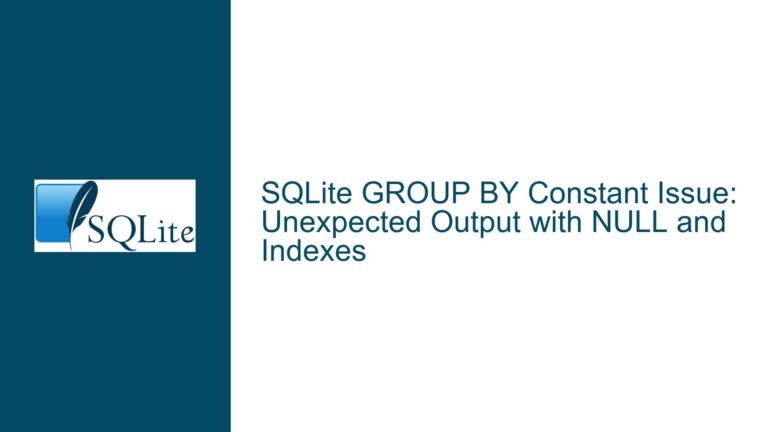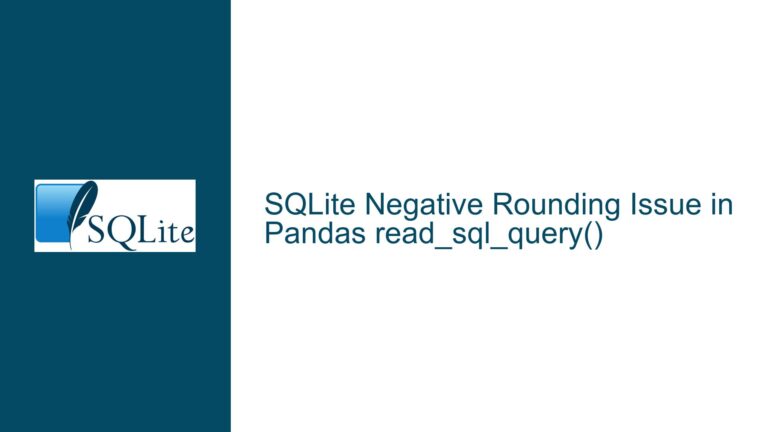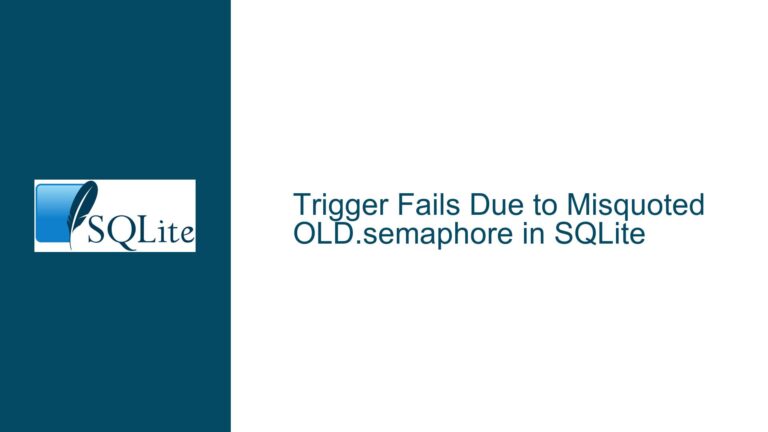Save and Restore PRAGMA State in SQLite Scripts
PRAGMA State Persistence Challenges in SQLite Scripts
SQLite PRAGMAs are essential for configuring database behavior at runtime, such as enabling legacy features, adjusting journal modes, or setting foreign key enforcement. However, managing PRAGMA states within SQL scripts presents a unique challenge. Unlike variables or session settings in other database systems, PRAGMAs in SQLite do not natively support dynamic value assignment or state persistence across script executions. This limitation becomes particularly problematic when users need to temporarily modify a PRAGMA value for a specific script without permanently altering the database configuration.
The core issue revolves around the fact that PRAGMA values must be literals, meaning they cannot be dynamically set or retrieved using standard SQL constructs. For example, if a script requires PRAGMA legacy_alter_table to be enabled for its execution, there is no built-in mechanism to save the current state of the PRAGMA, modify it, execute the script, and then restore the original state—all within the same script. This limitation forces users to resort to external programming logic or custom functions, which undermines the portability and simplicity of SQL scripts.
The problem is further compounded when scripts are shared across different environments or executed by users who may not have access to the underlying application code. Without a native SQLite solution, scripts that depend on specific PRAGMA settings risk failing or producing inconsistent results if the required PRAGMA state is not manually configured beforehand. This creates a significant usability gap, especially for applications that rely heavily on SQL scripts for database operations.
Literal-Only PRAGMA Assignments and Lack of State Management
The inability to dynamically manage PRAGMA states in SQLite scripts stems from two primary design constraints. First, PRAGMA statements in SQLite require literal values for their arguments. This means that expressions, variables, or subqueries cannot be used to set PRAGMA values. For instance, attempting to set a PRAGMA using a value retrieved from a table or a subquery will result in a syntax error. This restriction is deeply embedded in SQLite’s parsing and execution logic, making it difficult to work around without external intervention.
Second, SQLite lacks built-in mechanisms for saving and restoring PRAGMA states within a script. While some PRAGMAs, such as journal_mode or foreign_keys, can be queried for their current state, there is no standardized way to store these states temporarily and reapply them later. This forces users to implement workarounds, such as creating temporary tables to store PRAGMA values or defining custom functions to handle PRAGMA assignments dynamically. These workarounds, while functional, add complexity and reduce the readability and maintainability of SQL scripts.
The absence of dynamic PRAGMA management also impacts transactional integrity. For example, if a script modifies a PRAGMA value within a transaction, there is no guarantee that the original value will be restored if the transaction is rolled back. This can lead to unexpected behavior, especially in scenarios where multiple scripts or processes interact with the same database concurrently. The lack of transactional awareness for PRAGMA states further underscores the need for a robust solution to this problem.
Implementing Temporary PRAGMA State Management with Custom Functions
To address the limitations of PRAGMA state management in SQLite scripts, a practical solution involves creating user-defined functions (UDFs) that encapsulate the logic for saving, modifying, and restoring PRAGMA values. This approach leverages SQLite’s ability to extend its functionality through custom functions, providing a way to dynamically interact with PRAGMAs without requiring literal values.
The first step in this solution is to define a UDF that retrieves the current state of a specified PRAGMA. This function can be implemented using SQLite’s C API or a scripting language like Python, depending on the environment. The function takes the name of the PRAGMA as an argument and returns its current value. This allows scripts to store the PRAGMA state in a temporary table or variable before modifying it.
Next, a second UDF is created to set a PRAGMA value dynamically. This function accepts the PRAGMA name and the desired value as arguments and executes the corresponding PRAGMA statement. By encapsulating the PRAGMA assignment logic within a function, the script can avoid the literal-value restriction and use variables or subqueries to determine the PRAGMA value.
Finally, a third UDF is defined to restore the original PRAGMA state. This function retrieves the saved state from the temporary storage and applies it using the dynamic PRAGMA setting function. By combining these three functions, scripts can effectively manage PRAGMA states without requiring external code or manual intervention.
Here is an example implementation of this approach using SQLite’s C API:
#include <sqlite3.h>
#include <stdio.h>
#include <string.h>
// Function to get the current value of a PRAGMA
static void get_pragma_value(sqlite3_context *context, int argc, sqlite3_value **argv) {
const char *pragma_name = (const char *)sqlite3_value_text(argv[0]);
char query[256];
snprintf(query, sizeof(query), "PRAGMA %s;", pragma_name);
sqlite3_stmt *stmt;
if (sqlite3_prepare_v2(sqlite3_context_db_handle(context), query, -1, &stmt, NULL) == SQLITE_OK) {
if (sqlite3_step(stmt) == SQLITE_ROW) {
const char *value = (const char *)sqlite3_column_text(stmt, 0);
sqlite3_result_text(context, value, -1, SQLITE_TRANSIENT);
}
sqlite3_finalize(stmt);
}
}
// Function to set a PRAGMA value dynamically
static void set_pragma_value(sqlite3_context *context, int argc, sqlite3_value **argv) {
const char *pragma_name = (const char *)sqlite3_value_text(argv[0]);
const char *pragma_value = (const char *)sqlite3_value_text(argv[1]);
char query[256];
snprintf(query, sizeof(query), "PRAGMA %s = %s;", pragma_name, pragma_value);
sqlite3_exec(sqlite3_context_db_handle(context), query, NULL, NULL, NULL);
}
// Register the functions with SQLite
int register_pragma_functions(sqlite3 *db) {
sqlite3_create_function(db, "get_pragma_value", 1, SQLITE_UTF8, NULL, get_pragma_value, NULL, NULL);
sqlite3_create_function(db, "set_pragma_value", 2, SQLITE_UTF8, NULL, set_pragma_value, NULL, NULL);
return SQLITE_OK;
}
Once these functions are registered with the SQLite database, they can be used in SQL scripts to manage PRAGMA states dynamically. For example, the following script demonstrates how to save, modify, and restore the legacy_alter_table PRAGMA:
-- Save the current state of the PRAGMA
CREATE TEMP TABLE temp.save_pragma_legacy_table AS
SELECT get_pragma_value('legacy_alter_table') AS value;
-- Modify the PRAGMA for the script
SELECT set_pragma_value('legacy_alter_table', 'true');
-- Execute the script body
-- ...
-- Restore the original PRAGMA state
SELECT set_pragma_value('legacy_alter_table', (SELECT value FROM temp.save_pragma_legacy_table));
-- Clean up the temporary table
DROP TABLE temp.save_pragma_legacy_table;
This approach provides a flexible and reusable solution for managing PRAGMA states in SQLite scripts. By encapsulating the necessary logic within UDFs, users can achieve dynamic PRAGMA management without compromising the portability or simplicity of their scripts. Additionally, this method can be extended to support other PRAGMAs or more complex state management scenarios, making it a valuable tool for SQLite developers.






